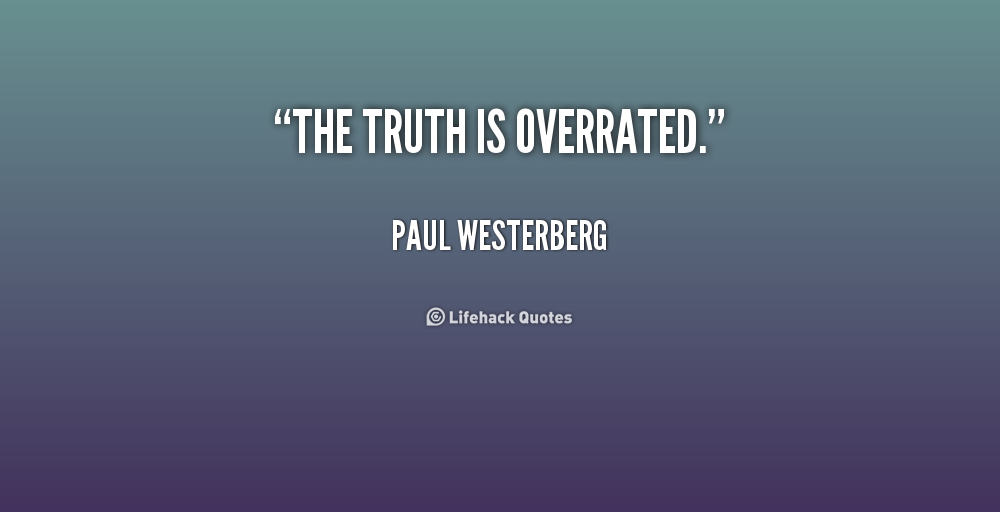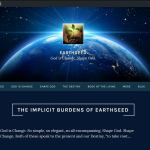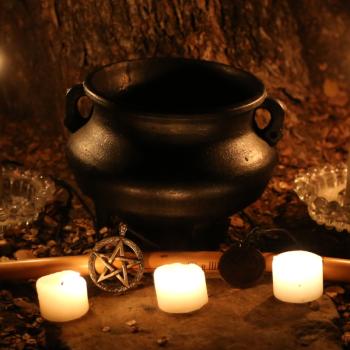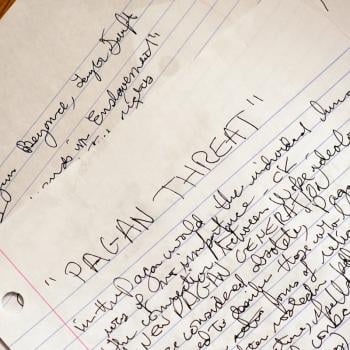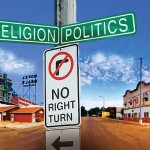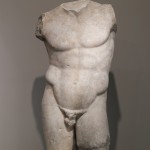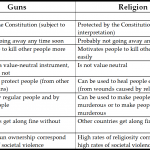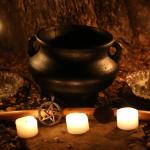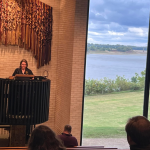I’ve been having an interesting discussion in the comments to my recent post, “I’ve forgotten why I cared: The irrelevance of (un)belief in the gods”. That post represented something of a breakthrough for me. The gist of it was that I find myself no longer so concerned with the question of whether anyone’s gods are “real”, and more interested in the question of what the gods mean to people. One of the commenters, Rob, challenged me on this. And the ensuing discussion was really interesting.
1. Truth is not simple.
Rob began by questioning how sincere my professed indifference toward the gods is. He pointed out that knowing whether something is real can be a matter of real significance — like distinguishing an oasis from a mirage or knowing how much money you have in the bank. But I think there are simple truths and there are complex truths — or simple and complex ways of framing any given “truth”. Take for example, the question of whether you have money in the bank. One a simplistic level, you either do have money in the bank or you don’t. And you need to know the answer to that question, or you can end up making choices (i.e., purchases) that can have very negative consequences for your life and those you are responsible for.
On the other hand, the question of whether you “have money in the bank” really is not that simple. Does your neighborhood bank actually have your money? Or any of our money? Well, they are required by law to have a certain percentage of it. But then there’s a loophole that allows them to borrow money at the end of the day from another bank if they don’t. Does this mean there is actually money — bills and coins — that are moved to their vault? No. It’s just electronic ones and zeros that are being moved around virtual networks. And then what is “money” anyway. Is it really the bills and coins that you care about? No. Because the value of those markers goes up and down. Is it the virtual ones and zeros? Is it the fungible symbol of labor or goods? So the question of whether you have “money” “in the bank” is a complicated one.
The same is true of question whether “the gods” “exist”. On the simplistic level, the question of whether the gods exists is a simple “yes” or “no”. And I think the answer is “no.” But there is a more complex level as well. What do we mean when we say “god”? Is it a object? An experience? A state of mind? A symbol? And what does “exist” mean? Do we mean objectively? Subjectively? Intersubjectively? The answer is at least as complex as the question whether you have “money” “in the bank”.
I’ve come to believe that the exist/don’t-exist dichotomy is overly simplistic. Rob and I are in agreement that, on the simplistic level, the gods don’t exist as invisible, incorporeal beings. But I think that’s the least interesting level to discuss the question. Rob argues that “existence is binary” — like pregnancy: you can’t be a little bit pregnant. But consider this: Years ago, my wife had a ectopic pregnancy — which means the egg was fertilized inside her fallopian tube. It was not viable and it almost killed her as it grew. Was she “pregnant”? Well, yes, in the sense that she had a fertilized egg in her body and the pH balance in her pee made the pregnancy test show a positive. But is was not a viable pregnancy. So she was never “pregnant” in the way that mattered for us as a family — in the sense we had a child on the way. In fact, my wife being “pregnant” in that case meant she almost died. So rather than my family growing, it almost shrank — exactly the opposite of what being “pregnant” was supposed to mean for us.
Words are not just representations of reality; they are carriers of meaning. And the same goes for words like “God”. I’m becoming more interested in what “God” means to someone — how it fits into their lives — than whether it corresponds to an objectively verifiable phenomena that can be repeatedly tested under controlled conditions — just as I was more interested in what being pregnant meant for our family than what it meant in the lab test.
2. Some truths are more interesting than others.
There’s some truths that really just don’t matter that much to me. For example, I don’t know whether dark matter is real. Or quarks. Or atoms for that matter. It just doesn’t affect my day-to-day life. Of course, I take it for granted that atoms are real, because that’s the current scientific consensus, but if tomorrow the scientific consensus shifts and the majority of scientists tell us that there is better way to interpret the phenomena we previously called “atoms”, then I will take that for granted too.
When people talk about “God” or “gods” they are using a word to try to explain an experience. I think there are better explanations for the things I have experienced and previously called “God”. I suspect that is true of other people’s experiences too. But if it turns out that some people are having an interaction with invisible, incorporeal beings who never bothered to talk to me — well, it really won’t affect me or my life in any significant way. Just like quarks and dark matter.
Rob went on to compare the existence of gods to the existence of aliens, arguing that their existence or non-existence should interest us. He wrote: “It would give us a whole new angle on the universe. If the gods really existed then it would be interesting to know what form of life they led. How do they spend their time. If they were real beings then they would have to have a culture and lead some kind of life.”
It’s not that I’m entirely uninterested in the question of the existence of gods, aliens, etc. Of course, I would be interested if they existed. But I would still get up in the morning, do my daily devotional, take a shower, go to work, come home, blog, and try to be a more actualized and more compassionate person than I was yesterday. There’s people in other parts of the world who live lives very different — very alien — from my own. Learning about them would be interesting, too, just as learning about some of the strange lifeforms that live on the bottom of the ocean would be interesting. And I might learn something useful from them — but most likely it would not transform my life in any major way.
Going back to my discussion of simple and complex truths, I’m just not that interested in the simplistic form of the question whether the gods exist — first, because I’m pretty convinced the answer is “no”, and second, because there is no reliable means of testing whether the answer is “yes”. But I am very interested in the more complex version of the questions: What do we mean when we say “gods”? And what do we mean when we say the “exist”? What meanings do these words have for us? How do they make our lives meaningful?
3. Truth is no guarantee.
Rob went on to argue that it’s liberating to come to understand that the gods are creations of our own imaginations — “that they are symbols of values and virtues and that our worship is purely expressive.” I too found the discovery of the non-existence of gods to be liberating — but I have come to appreciate that the belief in God/gods can also be empowering for some people. I relate to the experience of feeling disempowered by a belief in God/gods. As I have said before, one of the reasons I left monotheism was because I felt personally disempowered by theistic religion, and non-theistic Paganism helped me to reclaim that power.
But it’s one thing to say that I feel disempowered by a belief in gods, and another thing entirely to say that all people who believe in gods must be disempowered. Such a claim overlooks the fact that millions of people are actually empowered by their belief in a God or gods. Belief enables people to do things they would not otherwise be able to do. Whether you believe it is the “god within” or the “god without”, the effect is the same.
Rob also made the remarkable claim that “Any religion or philosophy that is does not make objective truth a central value is going to be ultimately morally corrupting even tho in the short term in may seem empowering and uplifting.” I used to believe that, too — I really did. But over the years I have seen how being “right” can sometimes be more “morally corrupting” than being “comforted”. I’ve seen it in others and in myself. I keep coming back to the saying, “Do you want to be right or do you want to be in a relationship?” More and more, I want to be in relationship, more than I want to be right. In fact, I think being in right relationship — with my fellow human beings, with the web of life, with the earth — is its own kind of “truth”.
And as far as I can see, being right or having the “truth” does not necessarily make us better people, more moral people, or happier people. In fact, some of the people I know who profess great concern for “truth” are the biggest assholes. I think concern about other people’s perceived lack of truth is often a cover for not dealing with our own shit — and, yes, I’m talking about myself here.
Truth is important — undoubtedly. And I have probably overstated my indifference to questions of truth here. Perhaps I should just say that there are other things that matter as much as truth to me. Things like beauty and compassion, a sense of meaning and a feeling of connectedness. And I think concern for the truth needs to be balanced with these things or in order for me to live what I think is a fully human life.

